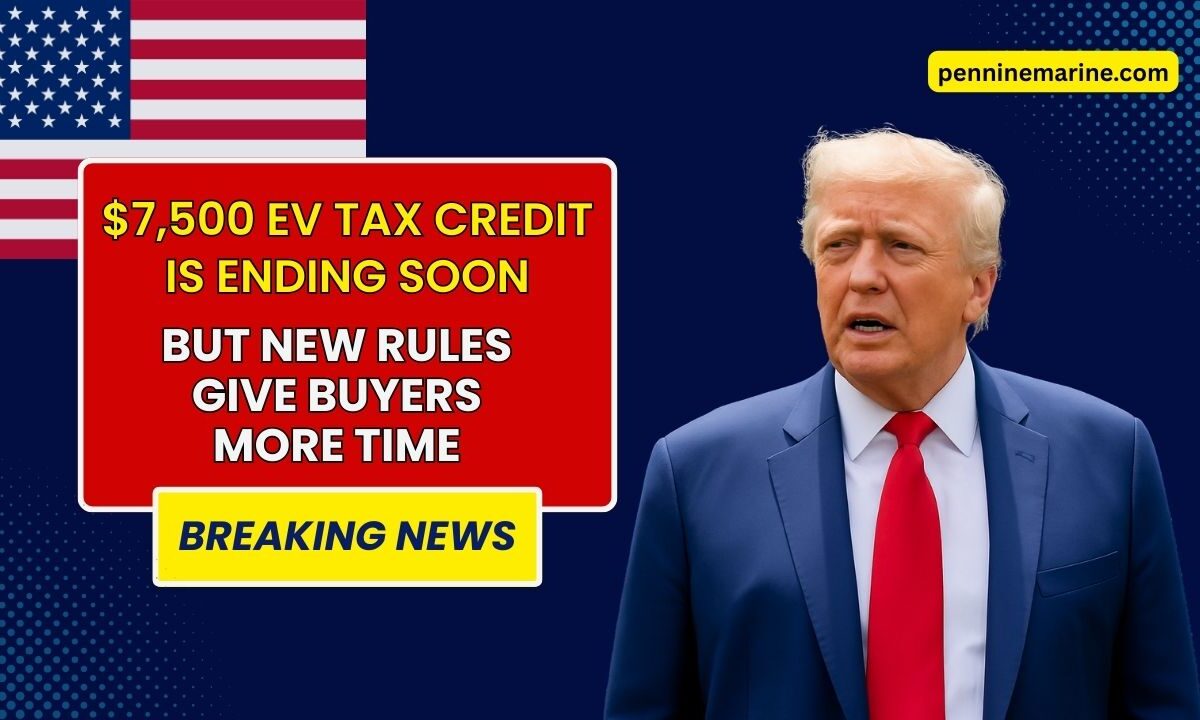The $7,500 electric vehicle (EV) tax credit is one of the most valuable incentives available to car buyers in 2025. However, this benefit is set to expire on September 30, 2025, under new provisions of the government’s updated tax and spending legislation.
While that deadline has caused anxiety for buyers waiting for their vehicles to arrive, the Internal Revenue Service (IRS) has now introduced a new rule that gives extra flexibility: buyers who sign a binding contract and make a payment before September 30 will still qualify for the credit, even if their car is delivered later.
This change is significant because until recently, eligibility was tied strictly to the delivery date. With shipping delays and production shortages still common, many buyers risked losing thousands of dollars in credits. Now, the risk is greatly reduced.
How the Clean Vehicle Credit Works
The Inflation Reduction Act of 2022 revamped the federal Electric Vehicle tax credit into what is now known as the Clean Vehicle Credit, extending it until 2032.
However, with recent legislative changes, the current version of the credit will end September 30, 2025.
The credit provides:
- Up to $7,500 for new EVs.
- Up to $4,000 for used EVs.
To qualify, vehicles must meet strict manufacturing, price, and sourcing standards, while buyers must also fall under income limits.
Eligibility Rules for the Electric Vehicle Tax Credit
Not everyone can qualify for the $7,500 credit, as it depends on both the buyer’s income and the vehicle’s price.
| Requirement | Details for New EVs | Details for Used EVs |
|---|---|---|
| Income Limits | $300,000 (joint filers), $150,000 (single filers) | $150,000 (joint filers), $75,000 (single filers) |
| Vehicle Price Cap | $80,000 for SUVs, vans & pickups; $55,000 for other cars | Must cost $25,000 or less |
| Age of Vehicle | New only | At least 2 model years old |
| Assembly Requirement | Must be assembled in North America | Same requirement |
| Battery Standards | Must meet critical mineral & battery sourcing rules | Not required |
For leased vehicles, these restrictions do not apply since they are categorized as commercial purchases. Dealers can apply the full $7,500 credit and pass the savings directly to the customer, regardless of income or sourcing requirements.
Why the New Rule Matters
The IRS now ties eligibility to the purchase contract date rather than the delivery date. This offers peace of mind to buyers in situations where their vehicles are shipped from another state or still in production.
For example, if a buyer places a deposit and signs a binding contract by September 30, 2025, they remain eligible for the credit even if the vehicle is not delivered until October. However, the credit is still claimed once the buyer takes possession of the vehicle.
This change ensures that last-minute buyers won’t lose out due to delivery delays beyond their control.
Steps Buyers Should Take Before September 30
If you plan to purchase an Electric Vehicle and want to claim the credit before it expires, here’s what you should do:
- Sign a purchase contract and make a down payment before September 30.
- Keep records of your agreement, payment receipts, and dealer documentation.
- Check vehicle eligibility through the dealer’s system, as required by the IRS.
- Confirm your income eligibility, since buyers remain responsible for meeting limits even if the dealer applies the credit.
Those considering low-interest financing promotions without down payments should be cautious, as skipping an upfront payment may disqualify them from the credit.
Why This Matters for Electric Vehicle Buyers
The Clean Vehicle Credit has been crucial for encouraging Electric Vehicle adoption in the U.S., helping millions of households offset the high upfront cost of electric cars.
With the average Electric Vehicle price above $50,000, this credit can make a substantial difference for middle-income families.
But as the deadline approaches, consumers must act quickly to lock in savings. After September 30, 2025, the current program will no longer be available, though new Electric Vehicle incentives may be introduced under future legislation.
The $7,500 Electric Vehicle tax credit remains a golden opportunity for those planning to switch to electric vehicles in 2025.
With the IRS’s new guidance allowing contracts and payments made before September 30 to qualify, buyers now have extra time and flexibility to secure their credit.
Acting early ensures you won’t miss out on one of the most significant financial incentives for EV ownership.
FAQs
When does the $7,500 EV tax credit expire?
It officially ends on September 30, 2025, though contracts signed and paid before the deadline may still qualify.
Can I get the credit if I lease an EV?
Yes, leased EVs qualify automatically without income or sourcing restrictions, as the credit is applied commercially by the dealer.
Do I need to apply for the credit?
No, in most cases, the credit is applied at the point of sale at dealerships, lowering the upfront cost immediately.
